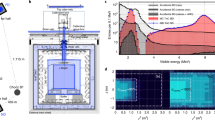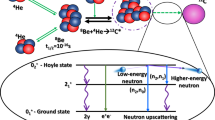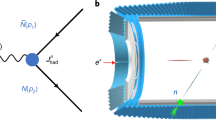Abstract
IN recent experiments1 we got information about the relative position of the resonance levels for neutron capture in certain nuclei. The levels could be arranged as follows: the level of Br having the highest, those of Rh, In and Ir the lowest energy.
This is a preview of subscription content, access via your institution
Access options
Subscribe to this journal
Receive 51 print issues and online access
$199.00 per year
only $3.90 per issue
Buy this article
- Purchase on Springer Link
- Instant access to full article PDF
Prices may be subject to local taxes which are calculated during checkout
Similar content being viewed by others
References
P. Preiswerk and H. von Halban jun., C.R., 202, 840 (1936).
O. R. Frisch and G. Placzek, NATURE, 137, 357 (1936).
Pontecorvo and Wick, La Ricerca Scientifica ii, 2, n.3-4.
G. v. Hevesy and H. Levi, NATURE, 136, 103 (1936).
Author information
Authors and Affiliations
Rights and permissions
About this article
Cite this article
VON HALBAN, H., PREISWERK, P. Cross-Section Measurements with Slow Neutrons of Different Velocities. Nature 137, 905–906 (1936). https://doi.org/10.1038/137905a0
Published:
Issue Date:
DOI: https://doi.org/10.1038/137905a0
This article is cited by
-
Resonance Levels for Absorption of Neutrons
Nature (1936)
Comments
By submitting a comment you agree to abide by our Terms and Community Guidelines. If you find something abusive or that does not comply with our terms or guidelines please flag it as inappropriate.



